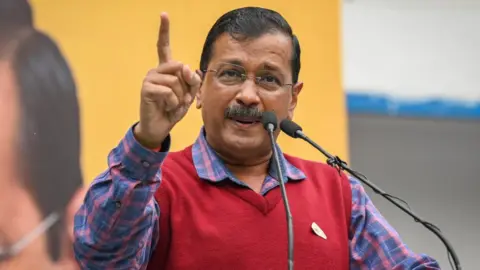Examine the consequences for Indian politics of Arvind Kejriwal’s arrest and prolonged detention as a well-known opposition leader in India. Investigate the claims, the scrutiny from across the world, and the wider ramifications for tolerance and dissent.
Recent events have provoked a flurry of national and international debates and conversations over the detention and subsequent jail extension of India’s well-known opposition leader, Arvind Kejriwal. The Aam Aadmi Party (AAP) leader and chief minister of Delhi, Arvind Kejriwal, is entangled in a corruption case that has great political ramifications. Let’s dissect this case’s intricacies and get into the specifics.
The Protests and Clarifications
Charges against Arvind Kejriwal stem from a corruption case involving a defunct Delhi regulation on alcohol sales. Accusations of bribes and illegal benefits given to private companies are made in these strongly refuted by Kejriwal claims that point to anomalies in the way the program has been implemented. Though Kejriwal has been adamantly denying the allegations and characterizing them as a “political conspiracy,” he is now at the center of a legal maelstrom that may have far-reaching effects.
Is it an anti-corruption movement or a political vendetta?
Presumptions of a political vengeance have been suggested due to Kejriwal’s incarceration occurring just before the general elections that are set for April and May. The opposition All India Pradesh Party (AAP) has said that the governing Bharatiya Janata Party (BJP) is planning a deliberate campaign to silence critics. However, the BJP insists that what it is doing is consistent with battling corruption and protecting the rule of law. The very divisive political climate in India is shown by the tug-of-war between these two powerful men.
Diplomatic repercussions and international scrutiny
A further degree of complication is added to the issue by the engagement of foreign parties, particularly Germany and the US. A fair and open judicial procedure has been demanded by both nations, who have voiced worries over Kejriwal’s detention. But India has responded to these remarks with force and promptness, stressing the sensitive nature of the matter on the international scene with diplomatic summonses and rebuttals.
What This Means for Dissent and Democracy
Kejriwal’s lawsuit highlights larger issues of democracy and dissent in India, going beyond the technical legal details. Political rivals and opposition leaders criticize what they see as a coordinated attempt to silence critics. An enormous amount of local and international attention has been placed on the use of investigative agencies and legal tactics to pursue opposition leaders.
Recap: Getting Around India’s Political Landscape
A microcosm of the larger forces reshaping Indian politics is the court case as it develops. An active, multi-party democracy like India has many difficulties, which are highlighted by the clash of power, ideology, and institutional frameworks. For years to come, the features of Indian democracy will be shaped by the implications of Kejriwal’s case, even if the verdict is still up in the air.
“Understanding Kejriwal’s Court Case in India’s Political Landscape”



